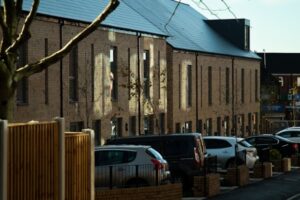In 2014 Salford made a pledge to become a ‘social value city’. Anne Lythgoe reports on progress so far.
Ian Stewart, the elected city mayor of Salford, has stated that the area has an ambition to become a ‘social value city’ where the majority of private, public, community and voluntary sector organisations are signed up to a social value charter and including social value in all their activities.
Building from an interest which pre-dates the social value act, a partnership which includes the local authority, health sector, and VCSE providers, has worked at three parallel levels – ‘strategic, commissioning/procurement, and provider’ – to create an environment which they hope will maximise social value.
Early on, the group used the analogy of railway tracks to describe how commissioners and providers develop their practices together, with the concept that if one got too far ahead of the other, the whole ‘social value train’ would come off the rails!
Local action has been boosted by Salford being one of the Department of Health-funded ‘social value in health and care’ programme pilots, delivered by Social Enterprise UK and Institute for Voluntary Action Research. External recognition as one of four pilot areas, and the mandate that gave locally helped drive forward and ensure commitment across a broad group of partner organisations. Although that initial programme is now complete, work is still driving forward, with social value being embedded into some key strategies, evolving commissioning practice and engagement with businesses in the city.
What is a social value city?
Salford’s social value charter aims to embed a social value approach and set of high level principles to the operation of as many public, VCSE and private sector organisations in the city as possible.
Local organisations are expected to:
- Embed social value: Adapt policies and governance arrangements to emphasise the role social value will play in services
- Deliver social value: Implement social value through their commissioning and procurement processes from assessment of need through to advertisement and pre qualification questionnaires, specification, evaluation and contract compliance.
- Demonstrate social value: Evidence how and when they have introduced social value into service delivery and the impact that this has made
The social value charter includes a vision that: ‘In Salford, we will look for relevant social, environmental and economic value from everything that we do, including service delivery, commissioning and procurement; Social value considers more than just the financial transaction and includes: Happiness, wellbeing health, inclusion, empowerment, poverty, environment’.
The Salford partnership has developed a set of principles for organisations working in the city, which include prioritising the social, environmental and economic wellbeing of Salford and its people in everything that they do. Social value is seen as something that is long-term, with investment being turned into long-lasting outcomes through social value, beyond the length of any service delivery contract. Partnerships are key, with organisations working together across sectors to provide social value outcomes and having values including inclusion, openness, honesty, social responsibility and caring for others. This is based in having a clear and current understanding of how social value can make Salford a better place to live.
Furthermore, in signing up to the charter, organisations make a commitment that their commissioning will comply with a clear set of standards and give social value significant and proportionate weighting within procurement criteria and decisions. Service providers will be expected to embed tools for monitoring and reporting social value as part of organisational processes and offer social value as part of tender submissions.
In order to keep track of the impact of the charter, monitoring is planned of factors such as: the flow of money in the local economy; the value of public contracts placed with local providers; the level of understanding of the benefits of social value; how many and what sort of organisations have signed up to the social value charter; and the capacity of local providers to report their social value.
Development of the charter has been supported by testing ideas at every stage of the commissioning cycle as part of the development of a Social Value Toolkit. This is practical set of tools for both commissioners and providers, covering all stages of the commissioning process. This work is supported by a programme of awareness-raising and training for commissioners and procurement staff in partnership with the Social Audit Network and New Economics Foundation.
Local examples: A social city in action
1. Unlimited Potential is an Industrial and Provident Society which uses social accounting to report on its social value. For each of its services, it reports the quantitative outcomes produced, together with qualitative evidence in the form of quotes and case studies from clients. The Society uses its social accounting to report on:
- The involvement of lay (non-professional) people in the governance of the Society
- The proportion of non-direct/staffing expenditure spent with ethical suppliers
- The percentage of employees who are local residents (living within five miles of their work base)
- The total annual carbon emissions/waste/travel per person
They invest all surplus for social purposes, allowing investment in new social innovations that carry higher risk than mainstream commissioners could take and/or for which it would be difficult to raise finance.
2. Salford City Council has developed a contract register which captures all procurement expenditure. The information currently tells us that 40% of expenditure is with suppliers from Salford; 70% is with Greater Manchester based suppliers and 86% is with businesses in the north west of England. Its aim now is to increase these figures even further through the social value charter and toolkit. Social value commitments made through procurement exercises are now tracked and reported to the city’s procurement board.
3. Salford Royal Foundation Trust. In 2011 the trust published the ‘Live Well, Work Well’ strategy, which set out objectives in a three year plan, to improve the health and wellbeing of patients and staff, ensure that the trust contributes positively to the lives of local people, and the environment in which they live. Achievements to date include:
- The Trust has an impressive recycling record, with around 85% of all waste being recycled.
- Introduction of a fitness programme in partnership with Salford Community Leisure, to offer physical activity sessions to staff on site four evenings a week, at a discounted rate.
- Introduction of routine screening programmes for smoking and alcohol, for both planned and unplanned admissions, for all patients.
- To find out more about Salford’s social charter: Visit the website or contact Anne Lythgoe
- The Social Audit Network is holding its 2015 annual conference in Salford in partnership with the University of Salford Business School on Friday 17th April.

















Leave a Reply